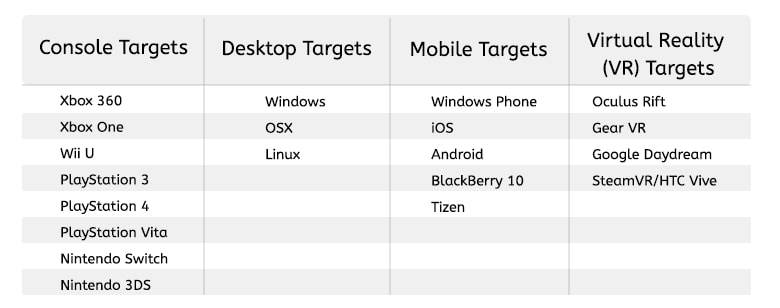Global video game market is growing big every year, and is estimated to reach staggering $90 billion by 2020. Most modern games of today, be it for console, PC or mobile, are based on software frameworks called game engines. A game engine provides a platform to use common set of requirements without writing hundreds of lines of codes, therefore saves developers precious man-hours and gives rise to rapid game development and cost effective solutions.
A game engine basically provides elements to draw 2D and 3D shapes, human-controlled character, computer-controlled character, objectives, levels, sound, scripting, animation, artificial intelligence, networking, streaming, memory management, etc.
However, choosing a game engine just because some publisher or developer of a successful game used it could prove precarious for your game. Before you choose a game engine, it’s paramount to be fully aware of the functionalities the game engine possesses and how they suit your specific game requirements. That said, we are going to a Unity vs Unreal Engine comparison to help you figure out which of the both could be the best fit for your game based on Usability, Functionality and Price Point.
Unity Vs Unreal Engine
Unity3D
Unity, created by Unity Technologies and first announced at Apple's Worldwide Developers Conference in 2005, has become a very popular cross-platform game engine among game developers world over. Six major versions of Unity have been released as of now, and it offer supports for languages, including C#, JavaScript and Boo.
Pros:
- Unity game developers can build both 2D and 3D games. Pokemon Go, Angry Birds Epic, Assassin’s Creed: Identity and Battlestar Galactica Online are some of the world-famous games that were built using Unity.
- Unity offers support for multiple platforms, including PC, mobile and major consoles showed below.

With Unity, you just need to complete a one-click process in order to publish to multiple platforms with ease. When it comes to cross-platform support, Unity tops Unreal Engine.
- Unity’s robust Asset Store offers numerous useful add ons, content characters, props and even things like sounds and particle effects. Unity’s app store is very big and has everything that your game requires. Unlike Unreal Engine, Unity provides access to a lot more additional stuff, like software for motion capture and tools for intuitive animation (at GUI level).
- Unity is free, which makes it a good choice for developers who just want to get started. The free version is capable of building excellent games, though you can get access to additional features by upgrading to Unity Pro or Unity Plus, but they come with a license fee attached to them.
You can purchase Unity Plus for $35 per month and Unity Pro for $125 per month. Upgrading to advanced versions of Unity is little expensive, but Unity does not charge any royalty fee from developers and publishers. You can check Unity’s website for different rate plans.
- As far as ease of use is concerned, Unity is generally seen as an easier and more intuitive choice to learn game engine. So, you will not face much hassles using Unity if you choose it for your game.
- Graphical capabilities of Unity are good, but can’t beat that of Unreal Engine, which is actually a next-generation game engine used by many AAA publishers. But, it doesn’t mean that you can’t develop a good 3D game with Unity.
Unity 5.6 brings support for Vulkan, a low-overhead, cross-platform 3D graphics and compute API, taking graphical performance to the next level. Unity also has a multi-featured tool for 3D development. It’s just that UE 4 has higher-level cutting-edge graphics suitable for intricate 3D mobile game development. Unity is more of the go-to-tool for building 2D games.
- Unity 5.6 also brings developers Facebook Gameroom, which allows to build and export your projects to Facebook using either WebGL or the Facebook Gameroom Windows app.
- New Light Modes in Unity replace Mixed mode lighting, which paves the way for users to combine baked lighting with real time lighting. Progressive Lightmapper enables proper handling of baked and real-time shadows.
- Unity has also announced the Timeline feature, a visual tool that allows to create cinematic content, cut scenes, complex particle systems, gameplay sequences, etc.
- Cinemachine is another amazing addition to Unity’s features list. It empowers a Unity game development company to use a virtual camera system in order to give the camera simple directions. And, the best part is that you can use the camera system to track and compose richly complex shots without even having to go through the hassles of coding.
- Unity also has a brilliant community support and offers an exhaustive documentation . Besides, it provides many learning opportunities through training sessions and live seminars.
Cons:
- Unity is expensive for those who want to access all its features. So, if you want to use Profiler as to unveil the areas that are making your game slow, you need to upgrade to a paid version of Unity. Same is the case for other features, like render textures, stencil support, buffer support, and many more.
- Although Unity’s code is stable, no access to the source code makes it difficult for developers to find, address and fix performance issues.
- Developers face performance issues with Unity’s built-in support for the PhysX physics engine. There’s a need to add some important functionalities in the PhysX physics engine to help developers craft the excellent game app.
- Unity games consume more memory, which often brings up OOM error and debugging issues.
- Unity lags when it comes to graphical performance, and requires a lot of optimizations if you wish to use Unity for creating a large AAA game title.
- Selecting object levels inside a level often turns out to be a very confusing and frustrating task as sub-objects have to be managed and attached to everything in the in-game object hierarchy.
- Unity’s animation controller system has some flexibility issues and causes more errors than Unreal Engine.
Unreal Engine
Unreal Engine was first brought to the attention of gaming world in 1998 with a first-person shooter game called Unreal. The engine, which was developed by Epic Games, got its name Unreal Engine from the game. The game engine was initially thought to be used only for first-person shooters, but it transcend its boundaries after being used for various other genres, including Stealth, MMORPGs, and other RPGs. Unreal engine only supports C++, but it offers an alternative discussed below for those who find coding difficult.
Pros:
- Unreal Engine is used for creating top-notch graphics for some of the highest quality AAA games on the market. Be it particles or lighting/shadows or process effects or terrain, Unreal engine brings them to life and makes them more interactive. Some of the games that were developed using Unreal Engine are: “Batman Arkham”, “Gears of War”, “Daylight”, and Fortnite.
So, if you are looking forward to create graphics for your game on a par with games you see being released on next-gen game consoles, Unreal Engine could fit your choice.
- Unreal Engine offers support for cross platforms showed below

- Unreal Engine is open source and free. So, you don’t have to pay anything for using Unreal Engine to develop your game, and you can still use everything that the game engine has to offer. There are no Pro or Plus with Unreal. However, you will have to pay 5% royalty fee after your game makes over $12000 annually (or, $3000 per quarter). The 5% royalty is to be paid after the first 3K quarterly.
- For API support, Unreal works with DirectX 10, DirectX 11, Vulkan (SM5) and OpenGL.
- Blueprint, a visual scripting editor, is one the best features of Unreal as it enables developers to build a game without even writing a single line of code. So, if you are not really good at programming, Unreal could be the engine of your choice for visualizations and architectural walk-throughs without having to worrying about writing code. Without a doubt, Unreal is a great engine for prototyping, but you need to have some C++ programming knowledge to complete serious tasks.
- Unreal Engine’s also has a brilliant asset store, allowing you to use a varied range of custom props, particle effects and characters. However, Unreal Engine’s asset store lag behind Unity when it comes to the size and price.
- Unreal Engine’s rendering technology is quite good and makes post processing really fast. The engine’s particle editor is much better than Unity's Shuriken system. Besides, Unreal has its own animation editor which includes separate tabs for skeleton, animation state machine, etc.
- Unreal Engine uses less memory and resources compared to Unity.
- Compared to Unity, Unreal has better access to visual debugging. So, you can test what, when and how is being drawn with ease. With Unreal, you also get complete control over the whole process and have clarity over how much time a certain element has taken.
- Unreal makes the entire source code available to community, therefore you can use the source code to figure out how certain functions and features work at lower level, and make the best use of them.
- Baking lighting is significantly faster in Unreal Engine
- As far as ease-of-use is concerned, it takes a bit of time to grasp Unreal Engine before you become familiar with it. But, it’s not that Unreal is not making efforts to address the ease-of-use issue. The user interface in the latest edition of the game engine was built to makes it easier and comfortable for users to learn and run the engine. However, Unreal is still not as easy to use as Unity is.
Cons:
- Although Unreal Engine is available for free to use, you will have to pay 5% royalty after the first $3000 per game per calendar quarter.
- Since Unreal Engine supports C++, Unreal has a bigger learning curve than Unity.
- Unreal Engine is not considered to be a good fit for small games and is often used for big projects that involve high costs and long duration. Most tools that Unreal provide are apt for building AAA games and much more. Unreal’s 2D is also lackluster compared to Unity.
- Unreal Engine offers limited support for older devices. The engine requires an updated, 64-bit Windows 7 system for optimal performance. It’s been learnt after conducting recent tests that UE4 drops to as low as 5 fps on older machines.
- Unreal Engine requires manual optimization for games.
- Unreal’s documentation is sparse and there is a lack of tutorials to help beginners quickly learn the technical know-how of the engine. So, Unity clearly gets an edge over Unreal here.
Both Unity3D and Unreal Engine are cutting-edge game engines, and like everything in the world they have their own pros and cons. Saying that “A sledgehammer is better than a clawhammer” will be wrong, as they both are tools and are not meant to be used for the same job. So, having clarity over what you want to achieve in your game makes the choice between Unity vs Unreal engine much easier.
We hope the Unity vs Unreal engine comparison helps you choose the right tool. Do you have a game idea and want to convert it into a reality but lack of tech know-how is holding you back? Don't worry! Logic Simplified can help you shape your dream game idea into a reality. Logic Simplified is a game development company and has hands-on experience of using various game engines, including Unity and Unreal, to build several highly engaging and interactive games. Please share your idea or game requirements by writing to us at enquiry@logicsimplified.com, and we will get back to you shortly to get you started outright.
 Get a Quote
Get a Quote











